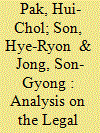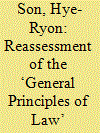| Srl | Item |
| 1 |
ID:
188817


|
|
|
|
|
| Summary/Abstract |
The 1969 Vienna Convention on the Law of Treaties is a fundamental treaty providing rights and obligations that states assume in the conclusion and implementation of treaties. Some of the provisions of the Convention, however, continue to divide the legal scholarship. One of them concerns the legal definition of jus cogens provided in Article 53 of the Vienna Convention on the Law of Treaties. The international community, particularly the International Law Commission, has exerted strenuous efforts for a long time to reach a consensus on jus cogens. Nevertheless, the legal definition of jus cogens is still open to varying interpretation among different countries and international publicists.
In this light, the article analyses the legal definition of jus cogens in three aspects. First, the connotation of the concept ‘peremptory norms of general international law’ is assessed in terms of particular, general and universal international law. Second, it analyses some problems arising in understanding the non-derogability from and modifiability of jus cogens. Finally, the article discusses some issues regarding ‘acceptance and recognition’ of jus cogens by the ‘international community of states as a whole’.
|
|
|
|
|
|
|
|
|
|
|
|
|
|
|
|
| 2 |
ID:
185642


|
|
|
|
|
| Summary/Abstract |
Currently, there exist several academic and legal questions on which common perception is not established among states. One of them concerns the interpretation of ‘general principles of law’ mentioned in Article 38(1)(c) of the Statute of the International Court of Justice. Variance in the interpretation of ‘general principles of law’ manifests itself mainly in controversies over whether they are principles of domestic law or international law and over the implication of ‘civilized nations’ that qualifies ‘general principles of law’. The article aims at analysing such divergent views surrounding ‘general principles of law’ and voicing the authors’ view on the matter. By examining the principles in comparison with international conventions and custom, and in terms of wordings employed in the relevant provisions, the article attempts to demonstrate that they must be viewed as principles shared by national law systems of certain states. It also argues that in view of the essential characteristics of international law, and in terms of the meaning of the term ‘civilized nations’, ‘general principles of law’ cannot be deemed a universal source of international law, and in particular, that since the phrase ‘civilized nations’ was not intended to include all states in the world, it is necessary to amend the relevant wording.
|
|
|
|
|
|
|
|
|
|
|
|
|
|
|
|